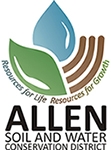If You Fertilize You Should Soil Test
Author is Beth Seibert, Stormwater and Watershed Programs Coordinator
Most of us push off thoughts of growing until late winter or early spring. But before you become obsessed with “decking your lawn with holiday décor” give your soil a little consideration. If you use fertilizer on your lawn or garden, then you should be soil testing every three years. For a little bit of your time, postage and nine dollars you can have some very specific information about one of the most important assets on your property – the soil resource.
Soil testing is especially important if you are someone who uses fertilizer, as it provides critical information for the land user to make informed decisions. Most people who fertilize do it out of habit. And fertilizer is so inexpensive and easy to use, that we don’t give it much thought. But statistics tell us that those of us who put fertilizer on our yards are generally doing so at a rate of eight times the amount farmers put on crop fields. Excessive fertilizer is washed to our rivers and streams every time it rains. Once it gets to the river it causes algae problems, robs oxygen from the water, and is a leading contributor of poor water quality.
Know How Much Fertilizer Is Actually Needed ― A common size lot in villages and cities is about 2/10ths of an acre in size and generally has a lawn about 1/10th of an acre or 4,356 square feet in size. Going by the fertilizer label, not by soil test results, that size of a yard only requires 14# of fertilizer. Most of us can’t believe that such a small volume of fertilizer is all we need, so we end up buying and applying a much larger quantity. If you apply fertilizer at a rate you can “see” it on your yard, you are definitely over-applying! So before buying any fertilizer you should know how much area you are treating. An easy way of calculating that is to view your property through the County Auditor’s website and use their measurement tool. Click here to go directly to the Auditor’s Property Search page. If you have questions about using the Measurement Tool call for information. We can help you in our office also.
The Hype About No Phosphorus Fertilizer – The leading components of fertilizer are Nitrogen-Phosphorus-Potassium. They are generally represented in this order on a bag of fertilizer by three numbers separated by hyphens. Fertilizer manufacturers are now producing phosphorus-free products because phosphorus attaches itself to the soil and stays there much longer than nitrogen does. Phosphorus is largely blamed across the U.S. for serious water quality impacts like those we are experiencing in this region in the Ottawa River, Grand Lake, and Lake Erie. So soil testing is an important step in actually knowing how much fertilizer your lawn or garden needs. It just doesn’t make sense to fertilize out of habit when you can save money and have your efforts protect local water resources.
Collecting And Preparing Soil Samples ― Soil testing involves you taking a shovel, hand trowel, or soil probe and collecting a small amount of soil from about 12 different places in your yard, garden or other target area. For lawn samples you should collect a sample three inches deep but for garden samples you should go down eight inches. Each individual sample should be relatively the same size or amount of soil. Always use a clean bucket or container to collect and mix your samples. Combine all the samples in your clean container, break the soil particles apart with your hands and mix well. From the well-mixed composite sample you take one cup (8 oz) of the soil, place it in a Ziploc bag and send it off to the soil test lab with your completed form and payment/check. About 3 weeks later you will receive your results! The Allen Soil and Water Conservation District (SWCD) recommends the Penn State University soils laboratory for local soils analysis. Area residents are reporting quite favorably on the lab’s service.
Allen SWCD can mail out a soil test form to you, or forms can be downloaded from their website on the soils page. For more information on soil testing call 419-223-0040 x3.


Leave A Comment